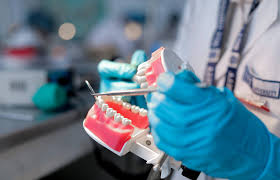Ph.D. in Clinical Dentistry: Introduction, Admission, Registration, Eligibility, Duration, Fees, Syllabus 2024

Introduction:
A Ph.D. in Clinical Dentistry is an advanced academic program designed to cultivate expertise and leadership in the field of oral health care. This rigorous program offers an interdisciplinary approach to dental research and practice, equipping students with the knowledge and skills to advance the understanding and treatment of oral diseases. Through innovative research, clinical training, and academic inquiry, students explore the latest advancements in dental science and contribute to the advancement of patient care and public health.
Admission Process:
- Submission of application materials, including transcripts, letters of recommendation, and a statement of purpose.
- Meeting minimum GPA requirements and demonstrating proficiency in relevant areas of study.
- Interview with faculty members or admissions committee to assess research interests and career goals.
- Evaluation of previous research experience and academic achievements.
Eligibility:
- A Bachelor's or Master's degree in Dentistry or a related field from an accredited institution.
- Demonstrated proficiency in clinical dentistry and research methods.
- Strong academic background in relevant sciences such as biology, chemistry, or biochemistry.
- Evidence of research potential through previous publications, presentations, or projects.
Completion Time:
The completion time for a Ph.D. in Clinical Dentistry typically spans from 3 to 5 years, contingent upon various factors. This advanced academic program combines rigorous coursework, comprehensive examinations, dissertation research, and clinical training to prepare students for leadership roles in dental research, education, and clinical practice.
Career Opportunities:
- Academic positions as faculty members or researchers in dental schools or universities.
- Clinical practice in specialized areas of dentistry such as periodontics, prosthodontics, or oral surgery.
- Leadership roles in dental research institutions, government agencies, or healthcare organizations.
- Consulting or advisory roles in dental product development or pharmaceutical companies.
- Public health initiatives focusing on oral health promotion and disease prevention.
Syllabus:
- Advanced courses in dental research methodologies, biostatistics, and epidemiology.
- Seminars on current topics in clinical dentistry, including diagnosis, treatment planning, and patient management.
- Dissertation research and writing on a specialized topic within clinical dentistry.
- Clinical training or rotations in dental specialties to enhance practical skills and knowledge.
- Elective courses in areas such as oral pathology, dental implants, or dental public health.
Internship Opportunities:
- Clinical internships in hospital settings or private dental practices to gain hands-on experience.
- Research internships with dental research institutes or academic institutions.
- Teaching assistantships to assist faculty members in dental education and training programs.
- Collaborative projects with industry partners or healthcare organizations.
- Community outreach programs focusing on oral health education and preventive care.
FAQs:
What research areas are covered in the Ph.D. program in Civil and Structure Engineering?
The program covers various research areas such as structural engineering, transportation systems, water resources, environmental engineering, and sustainable infrastructure development.
What career opportunities are available for graduates of this program?
Graduates can pursue careers in academia, engineering firms, government agencies, construction companies, and non-profit organizations focusing on infrastructure development and management.
What are the eligibility criteria for admission to the Ph.D. program?
Applicants typically need a Master's degree in Civil Engineering or a related field, a strong academic background, proficiency in relevant tools, and demonstrated research potential.
How long does it take to complete the Ph.D. program?
The program generally takes 4 to 6 years to complete, depending on factors such as prior academic background, research progress, and dissertation requirements.
Are there opportunities for internships or research collaborations during the Ph.D. program?
Yes, students have opportunities for internships with industry partners, research collaborations with faculty members, and fieldwork experiences with environmental organizations or government agencies.
Are there scholarships or grants available for Ph.D. students?
Yes, students may be eligible for scholarships, research grants, teaching assistantships, or other forms of financial support depending on their academic performance and research potential.
